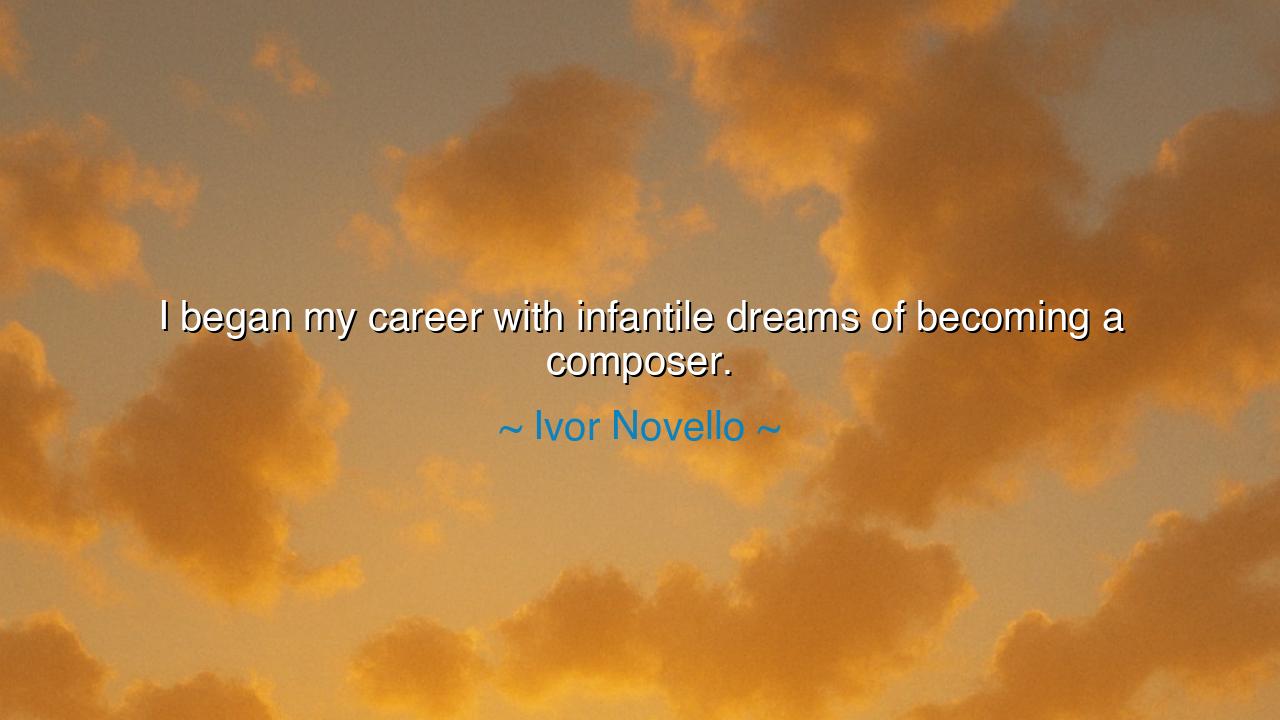
I began my career with infantile dreams of becoming a composer.






Hearken, children of the ages, to the words of Ivor Novello, a master of melody and the heart’s own chronicle, who confessed: “I began my career with infantile dreams of becoming a composer.” In this simple admission lies a world of truth, a mirror of the human spirit that dances between aspiration and reality. Even the greatest among men and women, Novello teaches us, began with dreams small and tender, naïve in their conception, yet filled with the seed of possibility. These infantile dreams, though fragile and unrefined, are the sparks from which the fires of genius may arise.
Consider the young Ivor, whose hands first traced hesitant notes upon the keyboard, whose mind wandered among imagined symphonies yet untouched by the rigor of craft. His beginnings were humble, playful, even unformed—mere fantasies of composition, as any child might conjure. Yet within those dreams stirred the promise of something greater: the courage to imagine, to reach beyond the ordinary, to hear melodies not yet sung. It is here that we witness a timeless truth: greatness is rarely born fully armored; it grows, nurtured by imagination and persistence alike.
This path of transformation from dream to mastery is echoed in the lives of many across the centuries. Recall Ludwig van Beethoven, who as a boy dared to dream of rivaling Mozart himself. He stumbled, faltered, even despaired at times, yet he nurtured his youthful visions with study, practice, and relentless determination. In every clumsy note and early failure lay the foundation for symphonies that would echo through eternity. So it was with Novello: the child’s dream was merely the seed, and years of discipline, passion, and labor made it blossom.
Even in the tender voice of youth, the heart intuits what the eye cannot yet see. Infantile dreams, though seeming small or foolish, contain the blueprint of the spirit’s deepest longings. They are the whispered guides to our true vocation. To dismiss them is to close the door to one’s own potential; to nurture them is to set upon a journey both uncertain and magnificent. Novello’s confession reminds us that every master once stood where the inexperienced stand now, trembling before possibility yet compelled by the call of creation.
In reflecting upon Novello’s journey, one sees also the importance of humility. He acknowledged the childishness of his initial vision, yet he did not abandon it. Here lies a lesson for all: to recognize one’s beginnings not as shame but as the fertile soil from which excellence may grow. History is filled with men and women who embraced their early imperfections and allowed them to guide them toward refinement. Michelangelo, painting the Sistine Chapel, once remarked that his first sketches were crude and inadequate, yet they were necessary—each humble beginning shaping the eventual masterpiece.
The courage to pursue infantile dreams is thus inseparable from the virtue of perseverance. Dreams, untempered by effort, remain idle fantasies. Novello’s life teaches that imagination alone is insufficient; one must engage with study, practice, and reflection. He moved from childlike visions to compositions that stirred nations, illustrating that the bridge from aspiration to achievement is built through persistent endeavor. This is the timeless rhythm of growth: dream, labor, stumble, rise, and continue.
Let those who hear this tale understand that their own beginnings, however small or seemingly naive, hold within them the potential for greatness. The whisper of a youthful dream is no trivial sound; it is a summons to action, a call to craft one’s destiny. To follow such a dream, one must nurture it daily, sharpen it with learning, and temper it with experience. The journey may be long, yet each note, each step, adds to the symphony of a life well-lived.
Finally, remember: greatness often wears the humble guise of childhood aspirations. Cherish them, act upon them, and allow them to guide your hands and heart. For in the recognition and cultivation of these early visions lies the pathway to mastery, to creation that transcends self, and to a life whose melody resonates far beyond the fleeting hours of our mortal span.
If you wish, I can also craft a short, poetic audio version of this explanation that captures the rhythm and emotional cadence of Novello’s journey for listening and reflection. Do you want me to do that?






AAdministratorAdministrator
Welcome, honored guests. Please leave a comment, we will respond soon